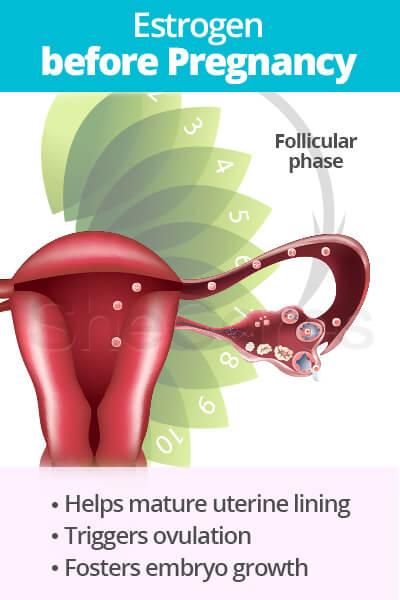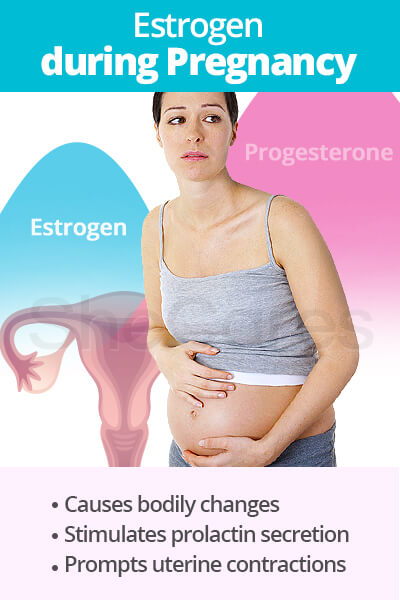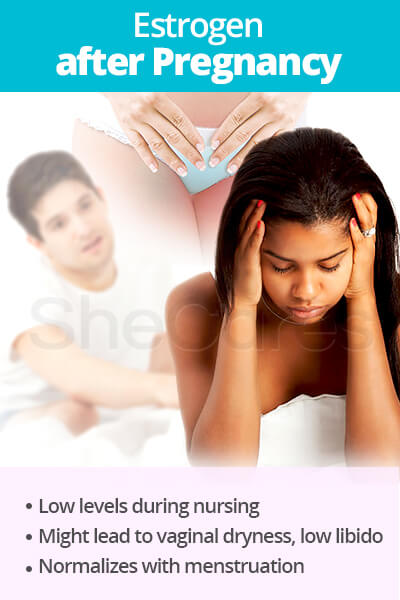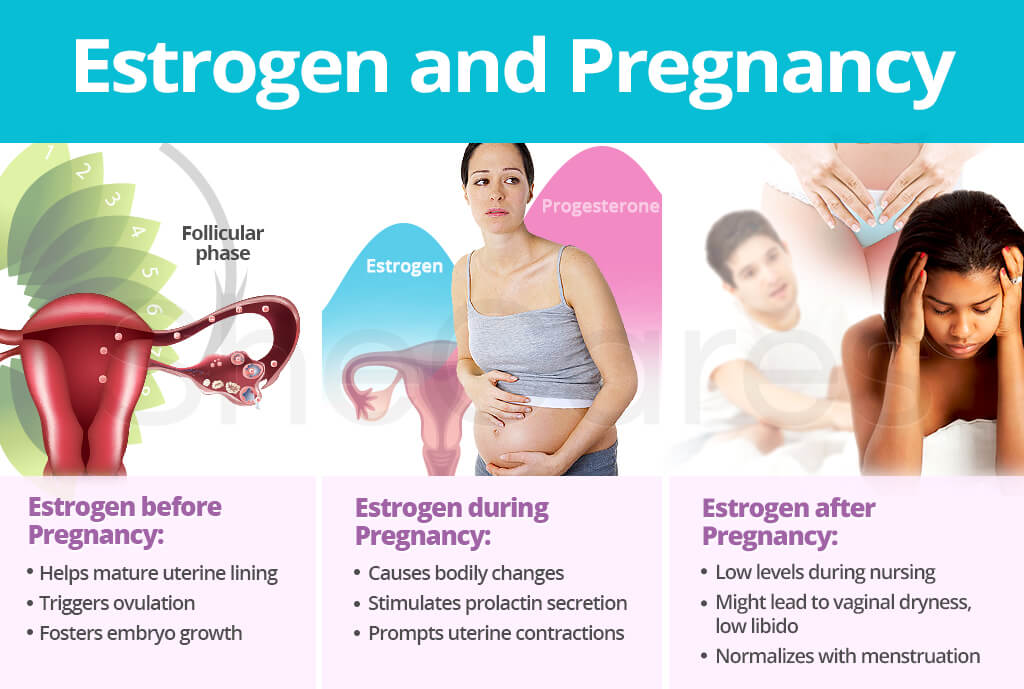During pregnancy, estrogen and other hormones take full charge of helping the body adjust to its new role. In fact, estrogen is one of the most important hormones needed to make conception possible. Its responsibilities begin with the menstrual cycle and end far after birth.
Therefore, understanding estrogen and its role in pregnancy will help paint a clear picture of the hormone's significance in bringing a baby to term.
Estrogen before Pregnancy

The follicular phase is the first half of the menstrual cycle, beginning with the first full day of menses and lasting until ovulation.
On day one of menses, estrogen is at its lowest point. The pituitary gland triggers production of follicle-stimulating hormone, or FSH, to begin follicle development and estrogen production. As a follicle matures into an egg, the cells around the egg produce estrogen. This estrogen helps grow and mature the uterine lining, which will nourish the embryo.
Once the follicle has produced sufficient enough estrogen, that spike in levels signals the pituitary gland to release luteinizing hormone, or LH. This subsequently triggers the release of the mature egg enveloped within the follicle during ovulation.
If the egg isn't fertilized, estrogen levels drop during the luteal phase - second half of the menstrual cycle - until the next cycle begins. However, if the egg is fertilized, estrogen begins to foster the growth of the embryo.
Estrogen during Pregnancy

Progesterone during pregnancy should always be higher than estrogen levels. Progesterone keeps the uterus from contracting and encourages the growth and maintenance of blood vessels and glands in the uterine lining.
Once the fertilized egg implants itself into the uterine lining, it begins to create the placenta. When fully formed, the placenta produces estriol from androgenic precursors in the fetal liver.
More than 90% of the estrogen enters maternal circulation through the fetoplacental unit. Research suggests that during the course of a healthy pregnancy, a woman produces as much estrogen as a non-pregnant woman would in 150 years.
Overall, estrogen in pregnancy causes growth and changes to occur in the mother's uterus, cervix, vagina, and breasts. It also causes significant alterations in the mother's body metabolism in regards to her salt and water balance, insulin secretion, and ability to break down sugars and carbohydrates.
Eventually, estrogen assists in stimulating the secretion of prolactin, which is used to produce milk.
When the baby is ready to be born, several factors prompt uterine contractions, with a sharp rise in estrogen levels believed to be one of them.
Research indicates that high levels of estrogen in late pregnancy block the “calming” influence of the placental progesterone.
Moreover, there is a marked increase in estrogen that starts about 24 hours before the onset of labor. This elevation fuels the production of oxytocin receptors in smooth muscle cells of the uterus, prompting contractions.
Estrogen after Pregnancy

Once after delivery, estrogen levels drastically decrease within the following 24 to 48 hours. In over half of women, these levels are so low that they resemble those of menopausal women.
Depending on the woman, the amount of estrogen may remain low for several months after childbirth until the next monthly menstrual cycle.
Moreover, when a woman breastfeeds, estrogen levels will be suppressed even longer with consistently high prolactin levels. In this way, breastfeeding can act as a form of birth control to help space out pregnancies, but some women may still get pregnant while breastfeeding.
At this time, since estrogen is responsible for vaginal and endocrine system health, lower levels during breastfeeding may contribute to vaginal dryness, decreased libido, hot flashes, and other symptoms as well.
Nevertheless, once menstrual cycles come back, estrogen levels return to normal. If they do not, it is important to seek care from a trusted medical professional.
All in all, estrogen plays a crucial role in pregnancy, from conceiving to preparation of the body for before and after parturition. However, this life stage is just one of many in which estrogen levels fluctuate dramatically.
Continue reading to find out more about estrogen and menopause and how the hormones fluctuate when nearing the end of reproductive years.
Sources
- Braun, C.A. & Anderson, C.M. (2007) Pathophysiology: Functional Alterations in Human Health. Philadelphia: Lippincott Williams & Wilkins. Available from Google Books.
- Briden, L. (2015). Period Repair Manual: Natural Treatments for Better Hormones and Better Periods. Publisher: Author.
- Chiras, D.D. (2005). Human Biology: Fifth Edition. Massachusetts: Jones & Bartlett Learning. Available from Google Books.
- Dermer, A. (2016). A Well-Kept Secret: Breastfeeding's Benefits to Mothers. Retrieved July 10, 2017, from http://www.llli.org/nb/nbjulaug01p124.html
- Eagle, S. et al. (2009). The Professional Medical Assistant: An Integrative, Teamwork-Based Approach. Pennsylvania: F.A. Davis Company. Available from Google Books.
- Miller, K.J. et al. (2007). The Estrogen Depression Connection: The Hidden Link Between Hormones & Women's Depression. California: New Harbinger Publications, Inc. Available from Google Books.
- Samuels, M. & Samuels, N. (1996). The New Well Pregnancy Book. New York: Fireside. Available from Google Books.
- PubChem: Open Chemistry Database. (n.d.). Estriol. Retrieved July 10, 2017, from https://pubchem.ncbi.nlm.nih.gov/compound/estriol#section=Top
- UCSF Medical Center. (n.d.). The Menstrual Cycle. Retrieved July 10, 2017, from https://www.ucsfhealth.org/education/the_menstrual_cycle/
- U.S. Department of Health and Human Services. (n.d.). Menstruation and the menstrual cycle. Retrieved July 10, 2017, from https://www.womenshealth.gov/a-z-topics/menstruation-and-menstrual-cycle
